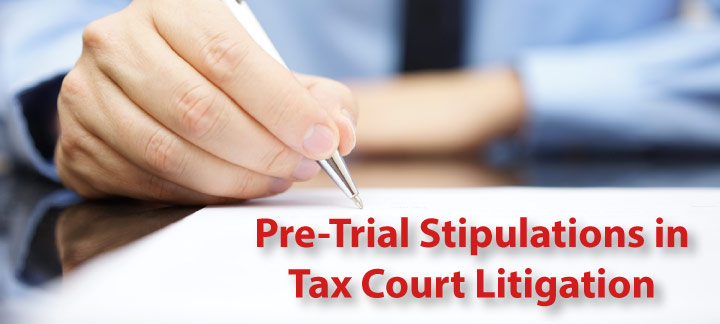Pre-Trial Stipulations in Tax Litigation
Litigation in the Tax Court is unique among all other forums in that the process involves various pre-trial stipulations made by both parties. In fact, the Tax Court requires litigant to submit to extensive pretrial stipulations, which are embodied in Tax Court Rule 91. Under these rules, the parties involved in tax litigation are required to stipulate, “to the fullest extent to which complete or qualified agreement can or fairly should be reached,” all non-privileged matters involving fact, opinion, or application of law to facts that are relevant to the proceeding (1). This obligation to stipulate also includes matters obtained through the discovery process (2). Along with drafting the stipulation of facts, there should be a stipulation conference between the two parties, which should be held as soon as the facts are developed. As a general rule, the parties should aim to hold the stipulation conference no later than 30 days after the issuance of the trial calendar.
Who Should Prepare the Proposed Stipulation of Facts?
The proposed stipulation of facts for tax litigation can technically be prepared by either party. However, it is generally in the interest of the taxpayer to draft the stipulation because the taxpayer has the burden of proof and has the best access to facts in the case. At the same time, the IRS generally encourages its own attorneys to take the initiative in drafting the stipulation, as seen in the Chief Counsel Directive Manual (3). The stipulation should include all documents relevant to the matter at issue before the Tax Court. If the authenticity of a document or fact is in dispute, the stipulating parties must make an objection based on materiality or relevance, but the item still must be included in the stipulation. Along a similar vein, a party may not refuse to stipulate to an undisputed fact simply because the offering party has the burden of proof.
The Form of the Proposed Stipulation of Facts
Stipulations must be in writing and signed by the parties or their counsel. They are typically filed, along with their associated exhibits, before the commencement of the trial unless otherwise directed by the Tax Court. When filing the stipulation with the Tax Court, the parties must attach all documents which are subject to the stipulation or intended to be placed into evidence.
Stipulations must be written in a clear and concise manner. They should be filled with facts, rather than conclusions, reasons, and arguments, and a statement of the issues in the case or the contentions of the parties. Each matter at issue should be listed in a separate numbered paragraph and each stipulation should be numbered with Arabic numbers. If either party has an objection to any part of the stipulation, it should be noted in the stipulation document itself and will be considered at the outset of the trial or during the trial if good cause is shown.
Binding Effect of Pre-Trial Stipulations
When a pre-trial stipulation is made by the parties to a tax litigation, that stipulation is treated as a conclusive statement of admission by each party. As such, the stipulation is generally considered binding upon the parties, but only for the pending litigation. The stipulation is not treated as binding for the purposes of other cases or proceedings. Once the stipulation is made, the parties cannot change, qualify, or contradict it except “as justice requires,” as determined by the Tax Court. For example, if a party entered into a stipulation under duress, the Tax Court would determine that the stipulation should not be binding upon that party. Similarly, a party could be released from a stipulation made as a result of mistake or ignorance of the law. In contrast, if a stipulation was entered into by taxpayer’s counsel, it is generally binding on the taxpayer unless there is evidence that the counsel entered into the stipulation without the knowledge or consent of the taxpayer. Finally, even though stipulations are generally binding upon the parties, the Tax Court will consider evidence presented at trial that is contrary to the stipulated facts. If such evidence exists, the Tax Court has the discretion to rely on the new evidence instead of the stipulated facts.
Another consideration in the binding effect of stipulations is that they are only binding as to the specific terms reached by the parties. If the terms used are ambiguous or subject to different interpretations, the court will construe the meaning of the stipulations based on the intent of the parties using contract principles. Along the same lines, if the language used in the stipulation is so ambiguous that the Court cannot reasonably interpret it, the stipulation will be disregarded altogether. For example, in Stamos v. Commissioner, the parties were subject to a stipulation that referred to state court proceedings “[t]o the extent the parties consider the circumstances, findings, or holdings … relevant.” Because the language of the stipulation was drafted as a condition on relevancy with no additional language between the parties regarding relevancy, the Court chose to disregard the stipulation. This case, and others similar to it, demonstrate the importance of drafting stipulations using precise and specific language.
How a Tax Attorney Can Help with Your Tax Litigation
If you are contemplating a deficiency litigation, then you must consult with an experienced tax attorney. San Diego Tax Attorney, William D. Hartsock has been successfully helping clients with tax issues since the early 1980s. Mr. Hartsock offers free consultations with the full benefit and protections of attorney client privilege to help people clearly understand their situation and options based on the circumstances of their case. To schedule your free consultation simply fill out the contact form found on this page, or call (858) 481-4844.
Tax Law References:
- Tax Ct. R. 91(a)(1).
- Tax Ct. R. 91(a)(2).
- CCDM (35)712 (Apr. 6, 1989).



Comments (0)